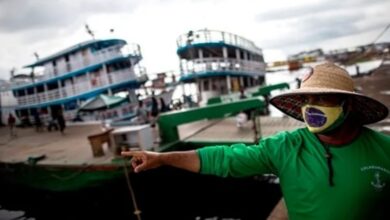Covid-19 affects all politicians equally
Although developing countries have more difficulties facing the crisis of COVID19, it seems that this inequality is not evident in the infections of their public officials .

Several public officials have been infected with the virus. / Photos: Reuters, TW-CarlosHolmesTru
LatinAmerican Post | Christopher Ramírez Hernández
Listen to this article
Leer en español: El Covid-19 afecta a los todos políticos por igual
On January 26, Colombia woke up to the news of the death of the country's Defense Minister, Carlos Holmes Trujillo, a victim of COVID-19. The death of the former diplomat occurred 14 days after confirming his infection with the coronavirus, and after 12 days in an Intensive Care Unit (ICU) of the Military Hospital of Bogotá.
It should be remembered that, according to the BBC, this is the "first senior official to die from the virus in Latin America"; However, he is not the first level politician to be infected in the region, nor in the world.
The most recent case was that of the president of Mexico, Andrés Manuel López Obrador, 67, who notified his contagion on January 24 through a publication that was uploaded on his Twitter account. “The symptoms are mild, but I am already under medical treatment. As always, I am optimistic. We will all move forward, "wrote AMLO on the social network.
With him, at least 17 are the first leaders who have acquired the disease.
Politicians: on the line of vulnerability
On March 11, 2020, the World Health Organization (WHO) decided to hold a press conference in which it notified what, since then, represented a turn for the history of the contemporary world: “COVID-19 can be considered a pandemic.”
According to the director-general of the WHO, Tedros Adhanom Ghebreyesus, the red alert was necessary in order not only to report the exponential growth of the disease on the planet but to increase the control mechanisms with which to counteract this pandemic.
Since then, the world has raised its alarms, understanding that social and economic life would not be the same, having as the only means of support, as expected, the health policies that each country imposed to control the virus, as well as, of course, to the rulers of said territories.
Thus, the policy took on a special connotation in the midst of the pandemic, placing governments as a focus of vulnerability, and leaders in the first line of contagion in the midst of the pandemic.
For this reason, it is not surprising that political leaders around the world have acquired the virus, with 17 presidents at the top of this list. The Prime Minister of the United Kingdom, Boris Johnson, was the first president of great world power to report the contagion of COVID-19, on March 27.
By then, the coronavirus did not have the same impact on American countries, so it took until June, when the president of Honduras, Juan Orlando Hernández, reported his infection on the 16th of that month, becoming the first Latin American president to contract the virus.
Hernández was followed by his counterpart from Brazil, Jair Bolsonaro (July 7), and former interim president of Bolivia, Jeanine Áñez (July 9) . On October 2, the turn was for the now-former president of the United States, Donald Trump, one of the most 'deniers' of the pandemic, and on December 17, it was the French Head of State, Emmanuel Macron, who notified his contagion.
It should be noted that the latter is one of the youngest to be infected with COVID-19 at 43 years old, while Trump, one of the oldest (74 years old).
Jerky virus?
Now, it seems that neither the age nor the place of origin of the leaders is directly related to their respective infections. In other words, the quality of the health system in each country does not influence the protection or possible treatment that can be offered to a political leader in the world.
For example, although, according to a graph presented by El País, Latin America and the Caribbean is the subregion with the highest number of deaths (almost 570 thousand as of January 23), the relationship between these figures and the number of infected leaders is lower compared to others like Europe.
While Europe leads the list of infected presidents and prime ministers, there are nine, Latin America has reported only five; six, if you take the entire American continent to include Donald Trump.
Also read: Do politicians deserve a vacation during the pandemic?
In addition, another contrast present in this parallel is that, despite the fact that Africa is the continent with the lowest number of deaths (86,774, as of January 26), it is the only one to witness the death of one of its top leaders: Ambrose Dlamini, Prime Minister of Eswatini or Swaziland, who lost his life on December 13, victim of COVID19.
For this reason, although the WHO has assured that “in some countries, there is a problem of lack of capacity […] of lack of resources […] of lack of determination”, these limitations are not synonymous with a greater threat of contagion for its officials public. In the midst of the pandemic, rulers, whether from poor countries or world powers, run the same risk in a "balanced" way. In this type of case, inequality is not an item to take into account.




